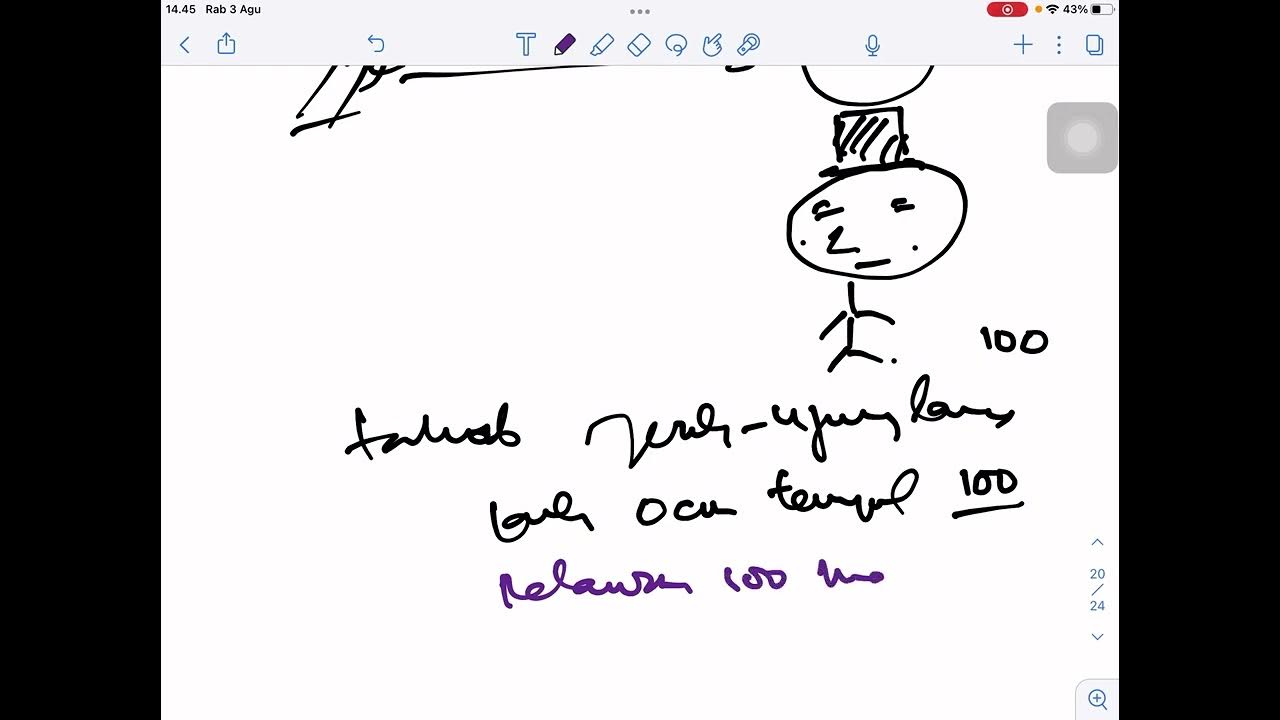MENINGKATKAN IMAN DAN TAQWA PADA TUHAN YME || Kurikulum Merdeka - Bidang Sosial
Summary
TLDRThe video discusses the importance of strengthening faith (iman) and piety (taqwa) among students as part of the Merdeka Curriculum. It begins with an initial assessment of students' daily religious practices, followed by examples of behavior that reflect strong faith and piety. The video outlines the benefits of being a devout individual, such as moral integrity and avoidance of sinful actions. It concludes with practical steps for enhancing one's faith and piety, and an evaluation to ensure these lessons are applied in students' lives.
Takeaways
- 🙏 The video begins with a greeting and a hope that the viewers are in good health and motivated to learn.
- 📖 The lesson focuses on enhancing faith (iman) and piety (taqwa) towards God, following the curriculum of Merdeka for social studies and classical guidance services.
- 📝 An initial assessment is provided for students to evaluate their daily activities and habits in relation to being a faithful and pious teenager.
- ✅ Students are asked to check how often they perform certain activities such as praying daily, reading holy scriptures, and helping others, and to explain their reasons.
- 👦 The script provides examples of behaviors that characterize a faithful and pious teenager, including belief in God, doing good deeds, respecting others' freedom to practice their religion, and not imposing one’s beliefs on others.
- 🌟 The benefits of being a faithful and pious teenager are highlighted, such as being conscious of one's actions under divine supervision and being motivated to do good deeds.
- 🙏 Practical steps to increase faith, piety, and good morals are suggested, such as attending religious places, associating with religious peers, reading holy scriptures, and engaging in positive group activities.
- 🤝 Encouragement is given to form youth groups that focus on positive activities like charity work, celebrating religious events, and spiritual tours.
- 🗣️ A group discussion is proposed for students to reflect on behaviors of faith, piety, and good morals, and to plan steps to practice these virtues.
- 🧩 A final assessment is conducted where students reflect on their understanding, identify areas for improvement, and choose an action to enhance their faith and morals.
Q & A
What is the primary focus of the video?
-The video focuses on enhancing faith (iman) and piety (taqwa) towards God, as well as evaluating these qualities. It is part of the Merdeka curriculum in the social services component of classical guidance.
What initial assessment is provided to the students?
-Students are given an assessment that includes daily activities related to faith and piety. They are asked to check whether they always, often, rarely, or never perform these activities and to provide reasons for their responses.
What are some examples of daily activities included in the initial assessment?
-Examples include praying daily, reading religious scriptures daily, worshiping according to religious teachings, giving charity, respecting and obeying parents, helping others, and avoiding lying and mocking others.
How does the video define faith (iman)?
-Faith is described as a heartfelt belief in the existence of God. It involves acknowledging God’s attributes and recognizing that one's actions are always under God's supervision, leading to accountability before God.
What is the relationship between faith (iman) and piety (taqwa) as explained in the video?
-Piety (taqwa) is considered the practical manifestation of faith (iman). While faith resides in the heart, piety is expressed through good behavior and obedience to religious teachings.
What are the benefits of being a pious teenager, according to the video?
-Being pious helps teenagers avoid actions prohibited by religion, encourages them to engage in activities recommended by their faith, and fosters the development of a morally upright and high-integrity individual.
What steps are suggested to increase faith and piety?
-The video suggests frequenting places of worship, deepening religious knowledge, associating with friends who are diligent in worship, reading and practicing the teachings of religious scriptures, and engaging in positive group activities.
Why is it important for teenagers to develop good character alongside faith and piety?
-Developing good character is essential because it complements faith and piety, leading to a holistic, morally grounded, and high-quality individual who contributes positively to society.
What group activities are recommended to help strengthen faith and piety?
-Recommended activities include organizing and participating in charitable work, celebrating religious holidays, engaging in spiritual tourism, and competing in acts of kindness such as helping those in need.
What is the purpose of the final assessment in the video?
-The final assessment aims to evaluate students' understanding of the material, identify behaviors that need improvement, and encourage them to take concrete actions to enhance their faith, piety, and moral character.
Outlines

Esta sección está disponible solo para usuarios con suscripción. Por favor, mejora tu plan para acceder a esta parte.
Mejorar ahoraMindmap

Esta sección está disponible solo para usuarios con suscripción. Por favor, mejora tu plan para acceder a esta parte.
Mejorar ahoraKeywords

Esta sección está disponible solo para usuarios con suscripción. Por favor, mejora tu plan para acceder a esta parte.
Mejorar ahoraHighlights

Esta sección está disponible solo para usuarios con suscripción. Por favor, mejora tu plan para acceder a esta parte.
Mejorar ahoraTranscripts

Esta sección está disponible solo para usuarios con suscripción. Por favor, mejora tu plan para acceder a esta parte.
Mejorar ahoraVer Más Videos Relacionados

TAUSIYAH SINGKAT EPS. 66 | Merenungi hakekat manusia sebenarnya

Implementasi Iman dan Taqwa dalam Kehidupan Modern || Ruang BKTV - BARENG BIMA

Menghadapi Keterpurukan Hidup dengan Iman & Takwa - Madrasah Orangtua Yayasan Anak Emas 23 Nov'24

KOLAK RAMADHAN #1 | Pentingnya Iman dan Takwa dalam Kehidupan Sehari hari

Agama pertemuan 02a

Keimanan Dan Ketaqwaan
5.0 / 5 (0 votes)
